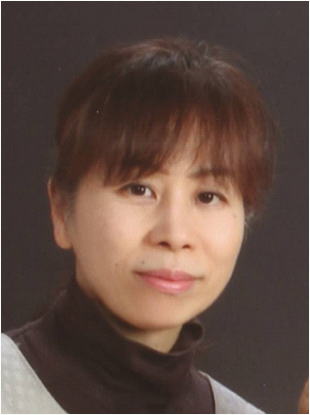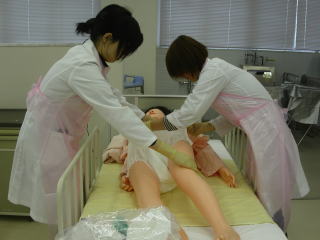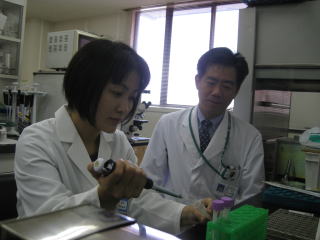■ Message from a professor
 |
Mihashi Mutsuko
Kurume University School of Nursing/Professor
|
 About me About me
In 1987, the city of Kurume commissioned Kurume University Hospital to respond to an outbreak of dysentery involving 120 people. I experienced that event as a nurse working in the isolation ward of the hospital. Infection control systems and protective wear were still primitive at the time, and ethical considerations for quarantine were seriously lacking. The shocking impression left by this event motivated me to work to this day for the progress of infection control nursing.
Infectious diseases have no borders and nurses with specialized knowledge are needed to deal with cases of domestic hospital infection control. Consequently, our goal is to develop specialists who can competently engage in prevention, epidemiological studies, basic research and practical nursing in the case of an outbreak.
|
 The curriculum The curriculum
We newly established this infection control nursing curriculum in April 2009 as part of our graduate master’s degree program in medical research. In accordance with our review standards for professional nursing education, students will require a total of 32 units to complete this course: 10 units for general education, 16 units for specialized education and 6 units for practicals.
 Program to Promote the Systematic Reform of Graduate Education (the “good
practice” program) Program to Promote the Systematic Reform of Graduate Education (the “good
practice” program)
The Ministry of Education, Culture, Sports, Science and Technology (MEXT) has undertaken three major efforts to improve the quality of graduate education and prepare the groundwork for international education. First, in 2006 the ministry implemented the Program to Promote Graduate Education. It then revised the national standards for graduate schools. Finally, MEXT created the Program to Promote the Systematic Reform of Graduate Education (the “good practice” program ) to encourage graduate and master’s curriculums geared toward developing highly advanced human resources who can thrive in a wide range of fields in society. Our infection control nurse development course of our master’s degree program applied to be part of the third good practice program, and received a three-year grant from MEXT in September 2009.
 Coursework Coursework
In addition to classes on basic medical science, social medicine, molecular life science and biostatistics, we have also added a number of courses concentrating on clinical nursing as part of our coursework.
Furthermore, students are able to learn about infectious diseases by directly participating in work performed by the infection control department of our university hospital such as actual infection control, hospital surveillance and prevention efforts. In this manner, we’re trying our best to support our students by responding to their learning demands.
 Classwork Classwork
We educate foreigners in Japan and Japanese citizens, including individuals with physical, auditory and visual disabilities, about infections for the purpose of building communities resilient to infectious diseases.
We head a group called Infection Control of Environment in Chikugo that engages in various regional infection control activities.
As part of efforts by the Japan Society for the Promotion of Science to contribute to society through the promotion and application of their research accomplishments on a practical level. We host a program called Inspirational and Stimulating Science where students in the 5th and 6th grade school as well as in senior high school students can actually see, hear and feel the cutting-edge scientific achievement first-hand. This part of an effort called KAKENHI sponsored by the Japan Society for the Promotion that aims make contributions to society and promote their research accomplishments to the public.
|
■ Message from current students
I am currently enrolled in an advanced program course that is part of the
curriculum for a master’s degree in infection control nursing. This course
was newly created in 2009. The goal of this course is to develop infection
control nurses versed in issues involving international infectious diseases.
It also aims to train healthcare professionals who know how to prevent
infectious diseases or perform infection control in the case of an outbreak
on an individual or community level.
Besides myself, three people were enrolled in the advanced course and five in the professional course. Studying with this group of individuals from diverse backgrounds was extremely stimulating, and made me consider issues from various angles. My seniors taught me how a given problem can be approached in many different ways, including some that I've never contemplated. In this manner, this course gave me the ability to absorb a wide range of perspectives.
As part of Practical I for International Nursing Studies, students participate in the introductory class of the Field Epidemiology Training Program offered by the NIID's infectious disease data center. They attend valuable lectures given by experts in various areas of infectious disease epidemiology including basic epidemiology. In Practical II, I travelled to Melbourne, Australia to deliver a presentation at the 5th International Congress of the Asia Pacific Society of Infection Control, and tour the Victorian Infectious Diseases Reference Laboratory as well as the Royal Melbourne Hospital. I was relieved that I was able to complete my presentation at the APSIC through poor English supplemented with expressive gestures.
I received support from many instructors in the course of my studies. I learned about infection control nursing from Prof. Mihashi Mutsuko and Dr. Yuka Sato, about infection control and treatment from Prof. Hiroshi Watanabe and Dr. Miho Miura, and about statistics from Prof. Tatsuyuki Kakuma. I also engaged in extremely informative interactions with graduate students from diverse backgrounds. The program was very hard at times, but at the end I felt a satisfying sense of accomplishment. I hope you will consider studying infection control at this enjoyable laboratory.
Atsushi Umetsu (advanced program course)
|
Three years have passed since I enrolled I this course. One of the reasons why I decided to enter graduate school is because I wanted to do more as a nurse for patients with infectious diseases.
I believe nurses who are involved in day-to-day treatment of patients are in a perfect position to become involved in a wide range of infectious disease-related medical activities such as prevention of onset and spread as well as physical and mental care for those infected. Individuals fall ill regardless of age, gender or race. Consequently, as a nurse I need to be able to thoroughly understand infectious diseases in order to manage infected patients with diverse backgrounds.
The course taught me about infection control nursing from both clinical and academic perspectives and I participated in practicals held at two hospitals. I learned about good practices and practices that require improvement by observing the differences between the hospital I usually work in and the hospitals I went to for my practical and by exposure to different types of infection control nursing styles among facilities. As a result, my education was extremely enlightening in the sense that I understood there is no single methodology for infection control nursing and that it is vital to consider the unique circumstances of each facility and region. I hope to be involved in infection control nursing after graduation.
Seiko Tonai (professional
program course)
 
|
|